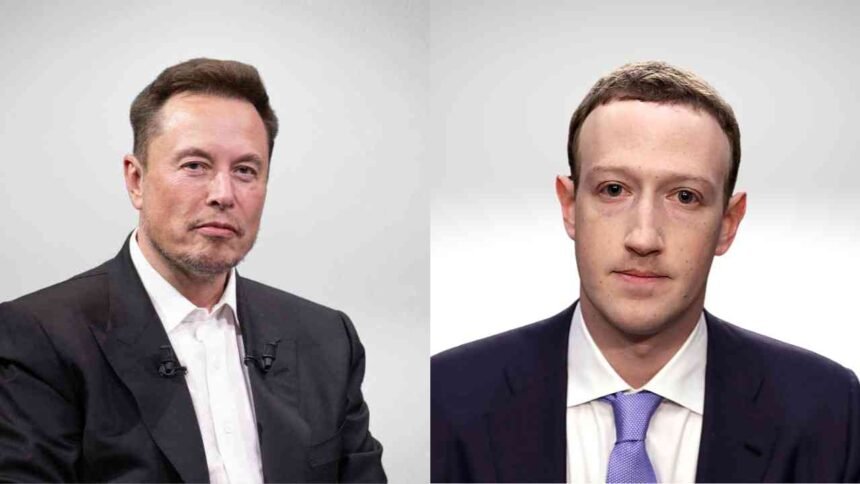Elon-Zuckerberg OpenAI Bid Sparks Global Attention
The Elon-Zuckerberg OpenAI Bid has captured global headlines after new court filings revealed that Elon Musk reached out to Mark Zuckerberg in February 2025 to help finance a staggering $97.4 billion takeover attempt of OpenAI.
The revelation has shocked the tech world, not just because of the bid’s size but because it suggests an unlikely collaboration between two long-time rivals. Musk, through his artificial intelligence company xAI, tried to bring Zuckerberg and Meta into the consortium of investors who backed the bid.
Although Zuckerberg never signed on, the story underscores the high-stakes power struggle in artificial intelligence where money, influence, and control intersect with ideology.
Musk’s Ambitious $97.4 Billion Proposal
In February 2025, Musk and xAI, alongside partners including Valor Equity Partners, Baron Capital, Atreides Management, 8VC, Vy Capital, and entertainment executive Ari Emanuel, submitted an unsolicited offer to acquire OpenAI’s nonprofit parent entity.
The offer valued the organization at nearly $100 billion, signaling both the importance and perceived market worth of OpenAI’s technology, particularly its widely adopted ChatGPT platform.
Court filings revealed that Musk believed involving Zuckerberg would add credibility and financial weight to the bid, even though their relationship has been anything but friendly in recent years.
OpenAI’s Firm Rejection
OpenAI’s board quickly rejected the proposal. In a statement issued in mid-February, the organization declared “OpenAI is not for sale.”
The board emphasized its mission to ensure artificial intelligence develops safely and remains accessible for humanity’s benefit. Leaders argued that Musk’s takeover attempt ran counter to the nonprofit charter and could destabilize the mission-driven governance structure.
Sam Altman, OpenAI’s CEO, added a personal and biting response.He joked that while OpenAI wasn’t interested in Musk’s money, his team would gladly “buy Twitter for $9.74 billion” if Musk was open to the idea.
Zuckerberg’s Role: Almost an Ally
The notion of an Elon-Zuckerberg OpenAI Bid is particularly surprising given the history between Musk and Zuckerberg.
The two billionaires have traded barbs over everything from social media platforms to space exploration. Their rivalry peaked in 2023 when Musk suggested an actual “cage fight” between them an event that never materialized but highlighted their public animosity.
Yet, according to court filings, Musk approached Zuckerberg in good faith to support the bid. While Meta’s CEO ultimately declined to join, the disclosure illustrates the unpredictable alliances forming in the battle for AI dominance.
Musk Lawsuit Against OpenAI
The bid came against the backdrop of a bitter Musk lawsuit against OpenAI and its leaders. Musk has long argued that OpenAI abandoned its original nonprofit mission by pivoting toward a profit-driven structure and raising vast sums of capital.
By proposing the takeover, Musk and his backers aimed to preserve or reclaim that original mission. He claims OpenAI’s shift contradicts the principles upon which he co-founded the company in 2015.
OpenAI, however, views Musk’s actions differently. The company countersued, accusing Musk of launching a campaign of harassment designed to discredit the leadership team, disrupt fundraising, and undermine operations.
Legal Battles and Counterclaims
In May 2025, Musk fired back with a motion to dismiss the countersuit, arguing that his takeover attempt and subsequent actions were legitimate, lawful, and constitutionally protected.
OpenAI insists the Elon-Zuckerberg OpenAI Bid was never serious and describes it as a publicity stunt meant to sabotage their growth. A jury trial is currently scheduled for 2026, ensuring that the legal fireworks will continue for at least another year.
The High Stakes of AI Takeover
The drama has broader implications beyond Musk, Zuckerberg, and Altman.
1.Valuation Pressure – The AI takeover attempt valued OpenAI at nearly $100 billion. Even though rejected, it has influenced how investors and regulators perceive the company’s worth.
2.Mission vs. Market – Musk’s insistence on safeguarding nonprofit governance highlights a deep tension between mission-driven ideals and commercial incentives.
3.Industry Power Shifts – If the bid had succeeded, it would have redrawn the power map in Silicon Valley, potentially positioning xAI and Meta as joint overseers of the most influential AI lab.
OpenAI’s Current Position
Despite the distractions, OpenAI has continued to grow. Recent reports suggest the company now serves nearly 500 million weekly ChatGPT users and has secured massive new funding, including investments from SoftBank, that pushed its valuation to around $300 billion.
OpenAI’s leadership insists that Musk’s legal maneuvers will not slow down innovation or disrupt its broader mission. But industry watchers believe the ripple effects of the bid could complicate fundraising efforts and strategic partnerships for years to come.
What Comes Next
The Elon-Zuckerberg OpenAI Bid may have failed, but it has reshaped the conversation around artificial intelligence and governance. The episode proves that even unsuccessful takeover attempts can send shockwaves through the industry.
For Musk, the lawsuit remains a tool to challenge OpenAI’s trajectory while bolstering his own AI venture, xAI. For Zuckerberg, the filing unexpectedly placed him at the center of a battle he chose not to fight. And for OpenAI, the ordeal is a reminder that the future of AI is as much about politics and power as it is about algorithms.
A Fight Far From Over
The powerful clash between Musk, Altman, and even the almost-involved Zuckerberg underscores just how valuable and contested the AI frontier has become.
The Elon-Zuckerberg OpenAI Bid might be history on paper, but its legacy will shape boardroom strategies, courtroom battles, and Silicon Valley rivalries for years. As the world watches, this showdown is no longer just about technology it’s about control, influence, and the future of intelligence itself.






